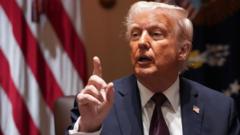Amid escalating trade tensions, President Trump has threatened the imposition of large-scale tariffs on Canada and the European Union, exacerbating the existing strain in international trade relations.
Trump's Tariff Threats Ignite Tensions with Europe and Canada

Trump's Tariff Threats Ignite Tensions with Europe and Canada
In a provocative social media statement, President Trump warns of significant tariffs if EU and Canada unite against U.S. economic interests.
In a late-night social media outburst, President Trump declared that he would retaliate against the European Union and Canada if they collaborated to inflict "economic harm" on the United States. This threat marks yet another chapter in the ongoing trade hostilities initiated by his administration.
"If the European Union works with Canada to cause economic damage to the USA, I will impose large scale Tariffs, far larger than currently planned, to protect our greatest ally!" Trump asserted in his post.
The statement poses new challenges for the EU, which is currently grappling with existing tariffs imposed by the U.S. on various goods including steel, aluminum, and automobiles. The United States, as Europe's primary trading partner, complicates the EU’s response strategy, with institutions scrambling to negotiate amid fears of future escalated economic conditions.
Trump's administration, however, appears disinterested in reaching a consensus to ease these trade tensions. Maros Sefcovic, the EU's commissioner for trade, emphasizes the importance of cooperation, stating, "In the end, as it is said, one hand cannot clap."
Faced with this geopolitical uncertainty, the EU is actively seeking new alliances and strengthening existing trade agreements. Heightened concerns regarding Trump's fluctuating military support have also motivated Canada and the EU to forge closer ties, with Canada stepping up its support for Europe's defense initiatives.
This ongoing narrative illustrates the intricate dynamics of global trade and the potent effects of U.S. policy decisions on international partnerships and alignments.
"If the European Union works with Canada to cause economic damage to the USA, I will impose large scale Tariffs, far larger than currently planned, to protect our greatest ally!" Trump asserted in his post.
The statement poses new challenges for the EU, which is currently grappling with existing tariffs imposed by the U.S. on various goods including steel, aluminum, and automobiles. The United States, as Europe's primary trading partner, complicates the EU’s response strategy, with institutions scrambling to negotiate amid fears of future escalated economic conditions.
Trump's administration, however, appears disinterested in reaching a consensus to ease these trade tensions. Maros Sefcovic, the EU's commissioner for trade, emphasizes the importance of cooperation, stating, "In the end, as it is said, one hand cannot clap."
Faced with this geopolitical uncertainty, the EU is actively seeking new alliances and strengthening existing trade agreements. Heightened concerns regarding Trump's fluctuating military support have also motivated Canada and the EU to forge closer ties, with Canada stepping up its support for Europe's defense initiatives.
This ongoing narrative illustrates the intricate dynamics of global trade and the potent effects of U.S. policy decisions on international partnerships and alignments.






















